Introduction
When we started working with small business owners, one thing became clear: they were exhausted.
Most of them were doing everything themselves, from answering customer calls, managing invoices, posting on social media, to keeping their websites alive. Marketing wasn’t just another task on the list; it was a daily juggling act that never seemed to end.
They had heard that content marketing for small business could drive visibility and sales, but turning that idea into action was a different story. And that’s the real challenge: content marketing works, but it requires time, consistency, and strategy; three things small business owners rarely have in abundance.
That’s where outsourcing content marketing comes in. It gives you access to an entire team of strategists, writers, designers, and SEO specialists without the cost or effort of building one in-house.
At RevvGrowth, we’ve seen what happens when small businesses finally get content marketing right. Instead of scrambling for leads, they start building a steady flow of inbound interest. Their content begins to work for them, not the other way around, creating long-term visibility and trust that fuels real growth.
For many small businesses, this is the point where marketing stops being reactive and starts being intentional. The process stops feeling like busywork and starts driving the kind of consistent growth you can actually measure.
Why Content Marketing Matters for Small Business Success
Content marketing for small business helps owners attract customers, build trust, and grow online visibility through valuable and consistent content. It uses blogs, social media, email, and SEO-driven strategies to drive traffic and generate qualified leads.
Effective content marketing focuses on affordable tools, clear storytelling, and targeted communication that meets audience needs. Small businesses use content to compete locally, increase brand awareness, and boost sales with measurable results.
A strong content strategy supports long-term growth and creates lasting customer relationships through useful, relevant, and engaging information.
Benefits of Content Marketing for Small Businesses
The biggest reason content marketing matters is simple: it levels the playing field. It allows small businesses to compete with larger competitors by focusing on authority, relationships, and local relevance instead of ad spend.
Here’s what an effective content strategy delivers:
- Builds brand visibility: Every optimized blog post, video, or podcast increases your presence in search results and social feeds. Over time, this visibility compounds, driving organic traffic and reinforcing your brand identity.
- Nurtures customer relationships: As Marcus Sheridan, author of They Ask, You Answer and a leading voice in inbound marketing, notes, “Content — assuming it is honest and transparent — is the greatest sales tool in the world.” Content builds relationships through consistent communication, turning casual visitors into loyal customers who engage with your brand repeatedly.
- Generates organic leads: When customers discover your content through search engines or social media, they’re already in discovery mode. By offering helpful resources instead of hard sells, you attract qualified leads who are more likely to convert.
- Converts traffic into sales: The right mix of blog content, case studies, and social proof helps move users from interest to purchase. According to Blogging Wizard’s 2025 research, brands that publish weekly content enjoy conversion rates up to 3.5× higher than those publishing monthly, a clear sign that content frequency and consistency fuel more sales.
- Builds long-term credibility: Unlike short-term campaigns, content builds lasting authority. It signals expertise in your niche, helping your business rank higher and earn consumer trust naturally.
Pros & Cons of Outsourcing
While many small businesses start by managing content internally, maintaining consistency is often the biggest hurdle. Outsourcing content marketing brings expertise, speed, and strategy to the process.
Outsourcing also introduces accountability, something often missing in DIY approaches. A dedicated agency like RevvGrowth doesn’t just create content; it aligns it with measurable outcomes such as traffic growth, lead volume, and search visibility.
Also read → Why hiring a content marketing agency is a better option than getting freelancers or going in-house
When Should You Outsource?
Outsourcing makes the most impact when your growth has plateaued or your content performance doesn’t match the effort you’re putting in.
If any of these sound familiar, it might be time to get help:
- You post inconsistently or run out of ideas.
- Your content isn’t ranking despite regular publishing.
- You lack SEO tools or insights to measure performance.
- You’re too busy managing operations to plan a marketing strategy.
In our experience, small business owners often realize they need support when they notice they’re creating content just to “keep up” and not to achieve a clear outcome.
Bringing in a content marketing agency transforms that cycle with strategy, structure, and measurable progress. When small businesses treat content like an asset rather than an obligation, it becomes the foundation for sustainable visibility, lead generation, and customer loyalty.
At RevvGrowth, we act as an extension of your marketing team, bringing strategy, consistency, and creative horsepower to your content. Our content marketing services include strategy development, SEO-optimized content creation, blog and article writing, content distribution, and performance tracking.
If you’re ready to turn your content into a growth engine instead of another to-do list, let’s make it happen. Book a free demo to see how RevvGrowth can help you scale your marketing efficiently and sustainably.
How to Choose the Right Content Marketing Agency for Your Small Business
Selecting a content marketing agency is one of the most strategic decisions a small business can make. The right partner can accelerate growth, improve visibility, and deliver measurable ROI. The wrong one can drain resources and create more confusion than clarity.
Choosing well means understanding not only what you need but also what to look for in an agency relationship:
- Assess agency expertise: Start by evaluating the agency’s experience with small businesses. Look for proof of success through case studies or examples relevant to your industry. Agencies that specialize in small business marketing usually understand how to balance affordability with strategy.
- Review the portfolio: Before committing, review the agency’s work. You’ll learn more from what they’ve already created than from what they promise to do. A credible content marketing agency will have a diverse portfolio, showcasing written blogs, social media campaigns, videos, and SEO-driven articles that demonstrate measurable outcomes.
- Examine the service offering: Small businesses often make the mistake of focusing only on content creation when what they really need is a content ecosystem. That includes strategy, SEO optimization, distribution, and reporting.
- Evaluate communication and reporting: Transparent communication is crucial. You should receive regular updates on performance, not just vanity metrics. Ask how often they report, what tools they use, and how results are tied to business outcomes like leads or conversions.
At RevvGrowth, we take a data-driven approach to content marketing, one that blends SEO precision with brand storytelling to deliver measurable results.
Our work with Atlan illustrates this well. We optimized their existing content using AIO and a reliable AI content engine, helping them not just rank higher on Google but also earn featured snippets and appear in AI-powered tools like ChatGPT and Perplexity.ai, serving as proof of optimization for the next generation of search.
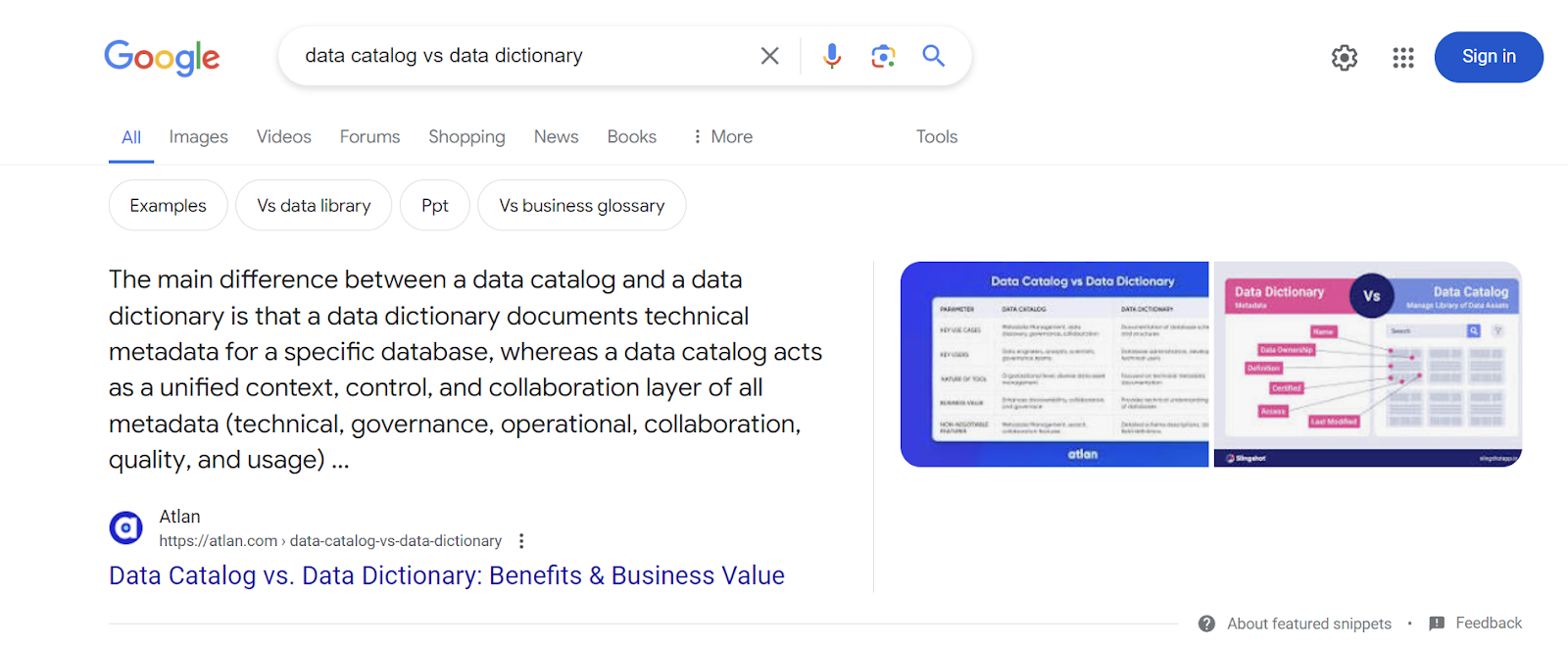

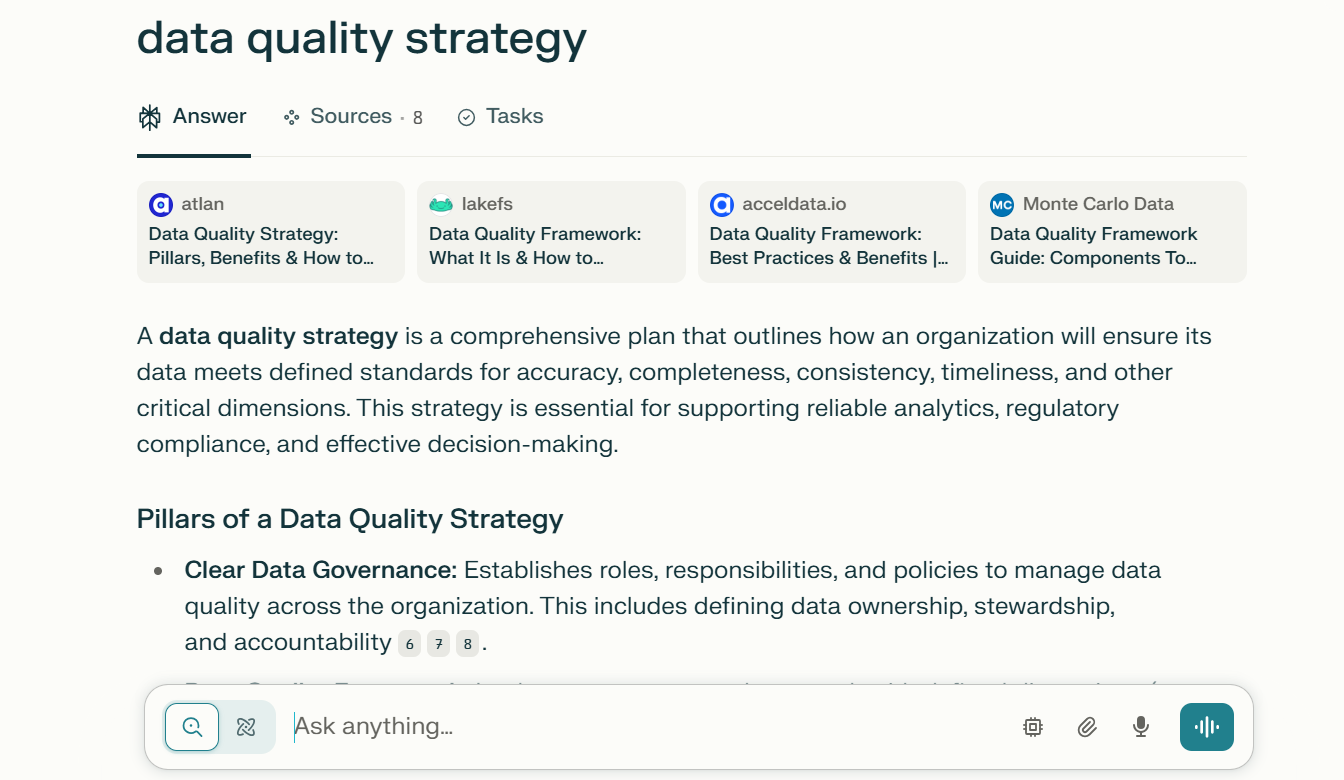
We now use a similar model with Everstage, a sales commission automation platform, by developing a content library that performs across both traditional and AI-driven discovery channels. Their blogs rank on Google and surface in ChatGPT and Perplexity.ai search results, broadening visibility beyond conventional SEO.
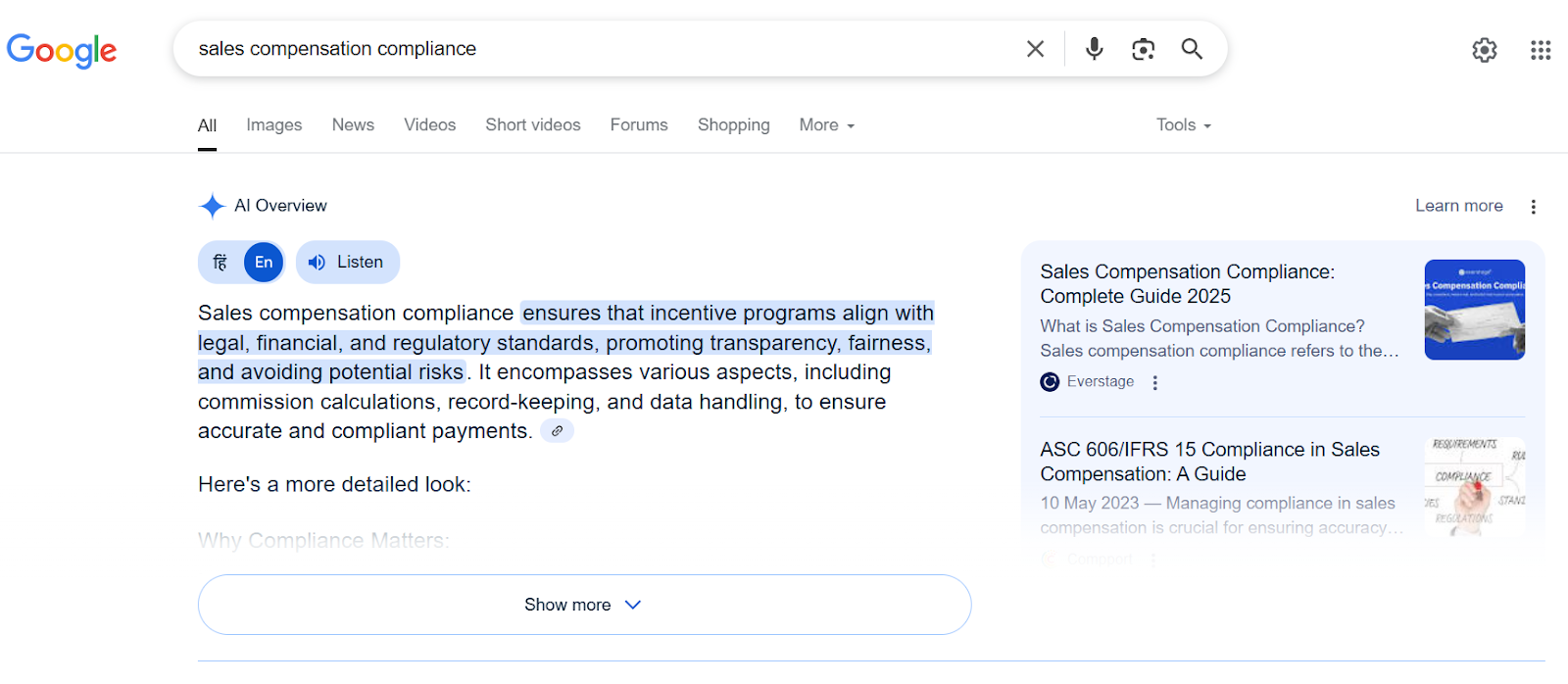
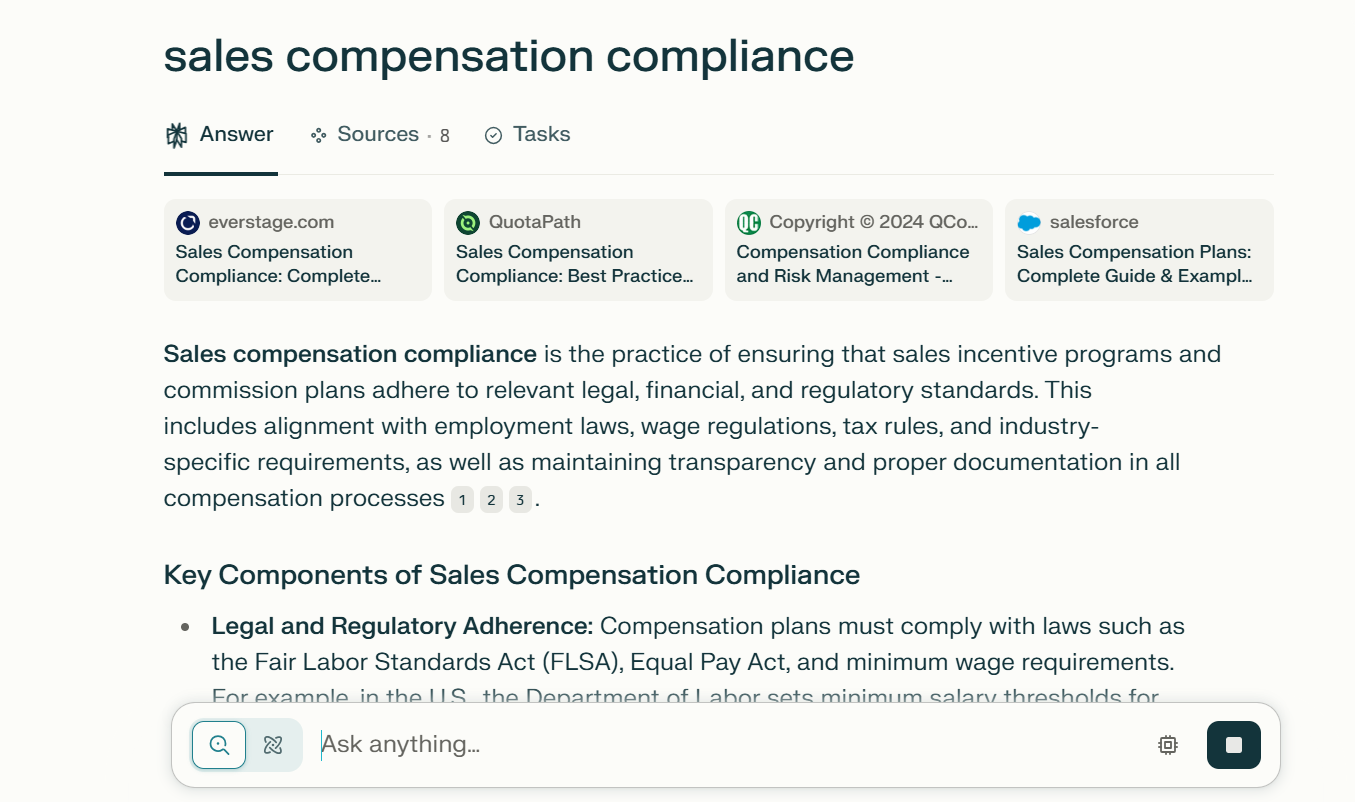
These projects show how we build content for visibility everywhere your audience searches, a strategy that helps small businesses scale authority and reach without growing their internal teams.
Content Marketing Tips to Keep In Mind
When we talk to small business owners about marketing, we notice a common pattern: plenty of great ideas, but no system to execute them consistently. A few blogs or posts appear, then momentum fades without a clear plan.
Here are the core principles we recommend for every small business.
- Start with a clear goal and audience: Before creating content, define what success means. Is it higher website traffic, more leads, or stronger engagement?
Content marketing often frustrates small business owners because it doesn’t deliver instant wins. However, experienced marketers emphasize that content and branding are slow, foundational marketing activities that help you grow over time, not overnight. This reminder underscores why goal-setting and patience are critical from the start.
- Create content you can repurpose easily: Every piece of content should work harder for you. A single blog post can become multiple social snippets, an email sequence, a video script, or even a LinkedIn carousel. The goal is to extend the lifespan of your ideas by adapting them to different formats and platforms where your audience spends time.
- Use data to guide every piece of content: Data should shape your content strategy. Use tools like Google Search Console and Ahrefs to identify trending keywords or rising topics.
According to Semrush’s AI Content Marketing Report, 67% of small businesses use AI and analytics to optimize content performance, and 68% report increased ROI.
- Mix formats to match the funnel: Different stages of the customer journey require different types of content:
- Awareness: Blog posts, reels, and social videos.
- Consideration: Downloadable guides, webinars.
- Decision: Case studies and testimonials.
- Automate where possible to save time: Automation tools like HubSpot, Buffer, or Make can handle repetitive tasks like scheduling or lead capture. This frees up time for creativity and strategy. We often help clients set up automation flows so they can focus on storytelling while we handle distribution.
- Collaborate With Experts or Agencies: You don’t need to do everything yourself. Many small businesses achieve results 2–3× faster when they partner with specialized agencies like RevvGrowth. We handle the process from ideation to execution, allowing business owners to focus on operations while the content engine runs efficiently in the background.
Also read→ 15 best AI tools for content marketing in 2025
Core Elements of a Small Business Content Marketing Strategy
A strong content marketing strategy gives structure to creativity. It ensures that every blog, video, or email supports your business goals rather than simply filling your calendar.
These are the foundational elements we focus on when building a scalable content strategy for small businesses.
Audience & Persona Research
Effective marketing begins with understanding who you’re talking to. Too often, small businesses create content based on assumptions rather than insights. Persona research bridges that gap.
Start by analyzing your existing customers. What are their goals, challenges, and decision triggers? Look at analytics, reviews, and even customer support conversations; they’re often goldmines for identifying real needs and questions. Tools like Google Analytics can reveal behavior patterns that help refine audience personas.
At RevvGrowth, we rely heavily on data-backed persona development. We don’t just ask who your customers are. We uncover how they search, why they convert, and what content influences them at each stage of their journey. This ensures your message connects deeply with the right audience.
Keyword & Topic Strategy (Pillars & Clusters)
Once you understand your audience, the next step is building your topic architecture. Think of it as your content map.
Your content should follow a “pillar-cluster” SEO structure. Create one comprehensive guide on a broad topic (like Small Business Marketing) and link it to related articles on social media tips, blogging strategies, and local SEO techniques. This boosts search engine visibility and user engagement simultaneously.
Content Types & Formats That Work for SMBs
Small businesses don’t need massive production budgets to create high-performing content; they need the right formats. The best strategy is to mix educational, entertaining, and persuasive content that aligns with your buyer journey.
Here are some of the most effective formats we use for clients:
- Educational blogs: Build authority and rank for relevant keywords while answering customer questions.
- Case studies: Showcase proof of results and establish credibility.
- Infographics: Make data or processes visually engaging and shareable.
- Email series: Nurture leads and keep your brand top of mind.
- Short-form videos: Increase engagement and reach across all social media platforms.
The 2025 State of Marketing Report by HubSpot shows that 29% of marketers now use short-form video as their most effective medium, while 21% report it generates the highest ROI.
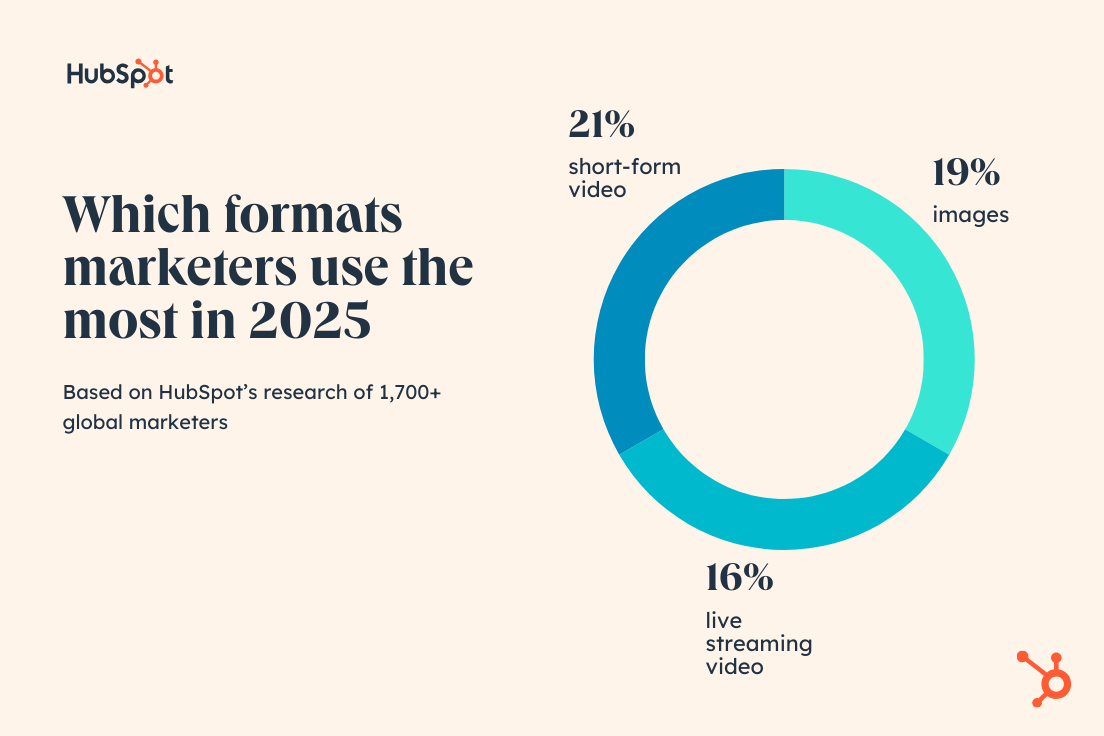
The key is to choose formats that play to your strengths. If you communicate well on camera, prioritize video. If you love writing, start with blogs. Consistency matters more than variety at the beginning.
Editorial Calendar & Repurposing Strategy
Content marketing thrives on rhythm. Without a schedule, even the best ideas fall apart. An editorial calendar brings that discipline.
It should outline your monthly publishing goals, assign responsibilities, and ensure a healthy mix of formats across platforms. We recommend using tools like Notion or Trello to plan topics and track deadlines.
Equally important is repurposing. A single core idea can be turned into multiple pieces of content across different channels. For instance, a long-form article about “Local SEO Tips for Small Businesses” can become:
- A three-part email sequence about improving visibility
- A short LinkedIn post summarizing the main takeaway
- A quick reel showcasing a real-world example
- A slide deck for a local webinar or workshop
Distribution & Promotion Tactics
Even the best content won’t perform if no one sees it. Distribution turns content into visibility. The most successful small businesses use a balanced mix of organic and paid strategies.
- Organic Distribution: Includes SEO, social media, email newsletters, and community engagement. Optimizing every blog for target keywords and sharing snippets across LinkedIn, Instagram, or Facebook keeps your brand visible and discoverable.
- Paid Promotion: Helps amplify reach quickly through sponsored posts, Google Ads, or influencer partnerships. Even a small budget, when targeted precisely, can accelerate early traction.
For local businesses, optimizing your Google Business Profile and integrating local SEO keywords can drastically improve discovery and credibility.
Final Thoughts and Next Steps
If you’ve been pouring energy into content but feel stuck, you’re not alone. Many small business owners are doing everything “by the book” but still aren’t seeing consistent results. The problem isn’t effort, it’s execution.
Content marketing for small business thrives on structure, consistency, and expertise. By partnering with a content marketing agency, you can access all three without overwhelming your team.
At RevvGrowth, we help small businesses transform their marketing into a scalable growth engine. Our clients see faster results, deeper engagement, and more qualified leads, all powered by strategic storytelling and data-backed execution.
If you’ve ever felt like you’re doing all the right marketing things but not seeing results, let’s change that. Book a free strategy call with our team. We’ll walk through your current approach, pinpoint what’s working, identify what’s holding you back, and map out how to build a scalable content engine that grows with your business.

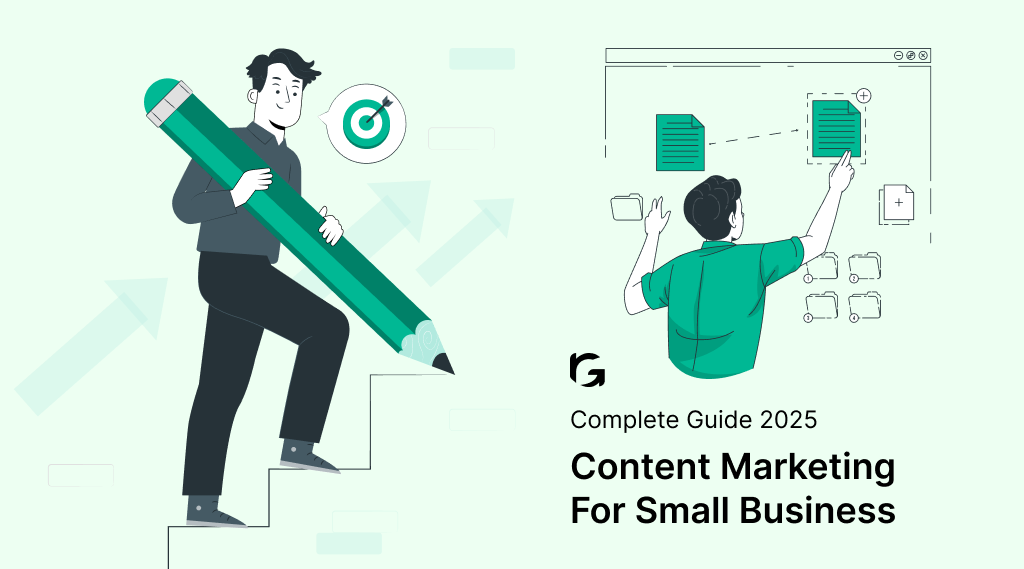

.svg)
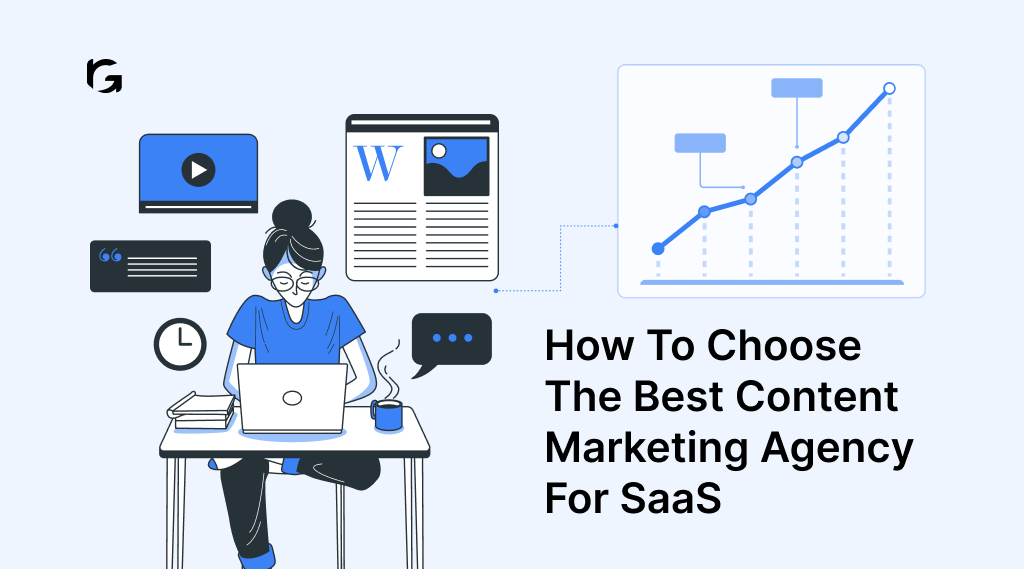
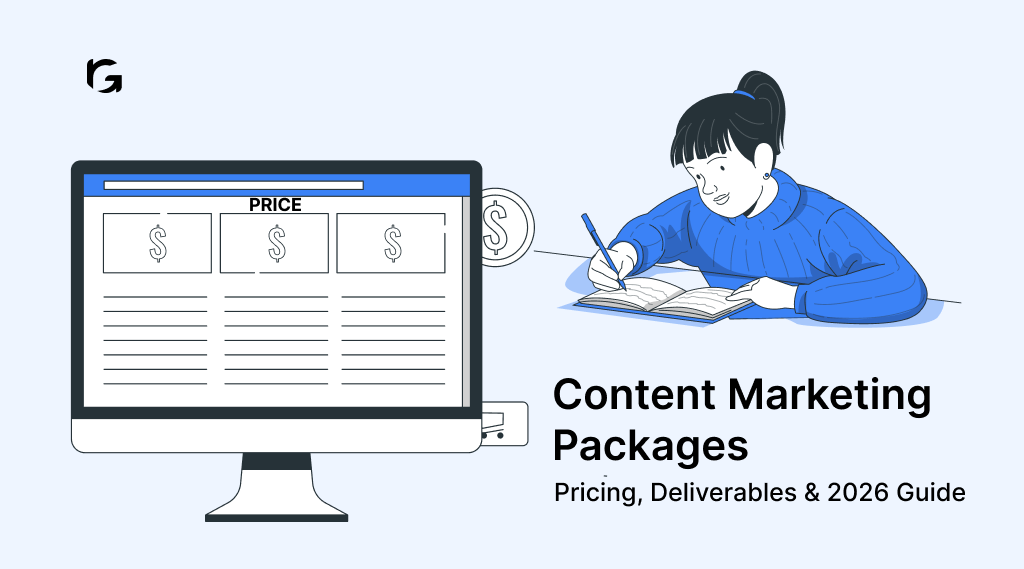
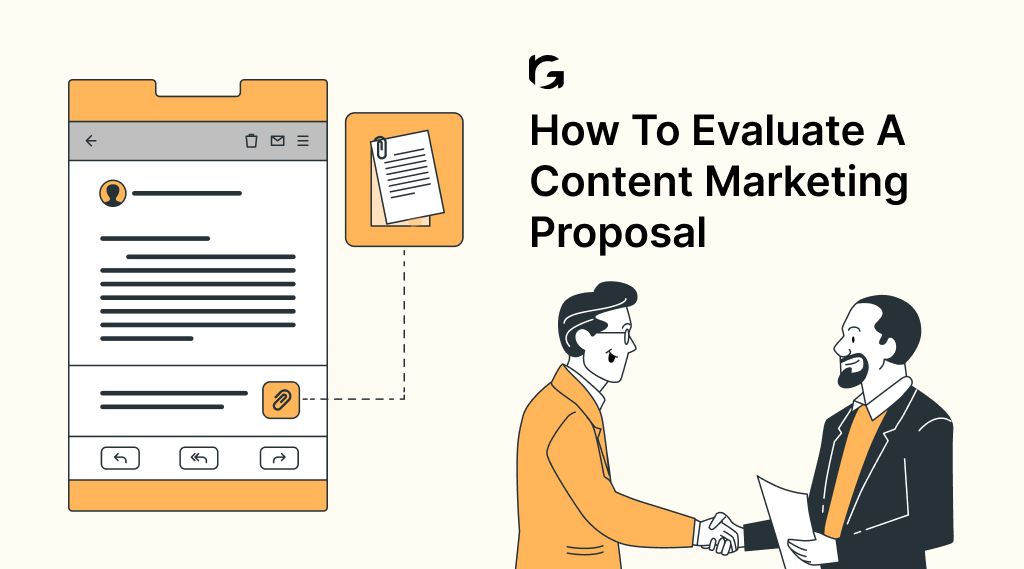
.webp)